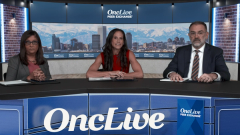
Current Treatment Landscape for AL Amyloidosis
Jeffrey Zonder, MD, offers an overview of the current treatment landscape for AL amyloidosis.
Episodes in this series

This is a video synopsis/summary of a Peer Exchange involving Heather Landau, MD; Vaishali Sanchorawala, MD; and Jeffrey Zonder, MD.
Panelists discuss the treatment landscape for light chain (AL) amyloidosis, focusing on targeting plasma cells to reduce toxic light chains. They note challenges in adapting multiple myeloma therapies for amyloidosis due to tolerability issues with certain agents. The primary FDA-approved induction regimen is cyclophosphamide-bortezomib-dexamethasone (CyBorD), which demonstrates effectiveness in reducing misfolded light chains, especially with the addition of the monoclonal antibody daratumumab.
Although the regimen significantly improves organ function, it does not impact early survival rates, particularly for patients at high risk of complications. The discussion highlights the ongoing complexities in treating AL amyloidosis, such as balancing effectiveness and survival outcomes.
Video synopsis is AI-generated and reviewed by OncLive® editorial staff.





































